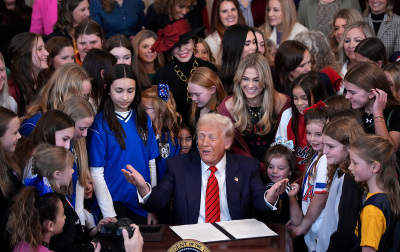
Is the battle over the participation of men in women’s sports, over the incarceration of men with women in U.S. prisons, over the presence of men in women’s lavatories — over the whole nexus of issues in transgenderism — well, over?
Those who follow opinion polls likely think the answer is yes. It’s the proverbial 80-20 issue. A February 25 New York Times/Ipsos poll asked specifically about sports, defining “transgender female athletes” as “athletes who were male at birth but who currently identify as female” and found that 79% of a politically balanced group of respondents opposed allowing the transgender females to play. Such robust, across-the-aisle, and in many cases effective opposition may suggest to many Americans that the battle is resolved.
Other indicators suggest that this issue, which has moved to the forefront of cultural conservatism, is now trending inexorably against the progressive grain. One of the prime indicators of such cross-cutting issues, of course, is the active role of prominent figures from the “other side” of traditional battle lines. Child tax credits fall into the cross-cutting category, with figures from both major parties competing to endorse ever-larger credits for ever more eligible beneficiaries. Contrast such bipartisan consensus with the parties’ and principals’ positions on illegal immigration. Contrast it, culturally, with abortion and gun control. The bipartisan agreement on tax credits is actually long-lasting now by political standards, dating back three decades or more to the mid-1990s.
The natural question now is, will the transgender consensus also endure?
There is some reason to think so. A tour of the internet finds an array of prominent liberals who are not only resistant to transgender social phenomena, but vocal and persistent about it. Take the acerbic Bill Maher. Some of his opposition might be attributed to the political harm the “T” issues are seen as inflicting on Democrats, but by no means all of it. Maher has said on a podcast debate with actor Jon Lovett, “You … want to lose every election? Just keep coming down on the side of parents coming in second [in] a ‘Who gets to decide what goes on with my kid’ contest?” Maher was referring to actions by progressive school and medical personnel, well-documented by author Abigail Shrier, to inaugurate reidentification of children as members of the opposite sex without notice to their parents.
Other prominent voices who accept most elements of the progressive agenda on sexuality have been plainspoken about transgender participation in cross-sex athletics and use of lavatory facilities. International tennis hall-of-famer Martina Navratilova, who came out as bisexual in 1981 and later declared herself lesbian, has been particularly outspoken on these topics. In an article for the Sunday Times in 2019, she wrote that it was “insane” that “hundreds of athletes who have changed gender by declaration and limited hormone treatment have already achieved honors as women that were beyond their capabilities as men.”
J.K. Rowling, the uber-successful author of the Harry Potter series, mystery novels, and related projects, is an extremely compelling voice on the same issues, defending women’s privacy in public spaces and the barring of transgender contestants from women’s sports. She has written, “Workplaces across the [W]est have imposed a Kafkaesque situation on women. A belief system most people consider nonsensical but which, in elite circles, has become almost a religion, has been imposed from on high. Women are being persecuted and punished for not pretending they think men can change sex.” She charges men who want to compel recognition of transgender status as engaging in a “typically male power-play” that inflicts “moral injury” on vulnerable women and girls.
With such prominent figures on their side, can advocates for women’s privacy and sports fail? Just a week after taking office in January, President Trump issued the first in a series of executive orders designed to reverse recent policies on transgender issues. The order constituted a wide-ranging revision of federal policy to reform all references in federal regulations and policies to ideological gender categories and to replace them with clear language referring to the two sexes, male and female. It set forth policy requirements with respect to housing of federal prisoners, sex changes for federal inmates, occupation of federally supported housing shelters, interpretation of the nation’s civil rights laws, and more. President Trump has issued additional executive orders and other actions designed to curtail federal participation in and encouragement of sex-change procedures and surgeries on minors, end support for federal education policies promoting transgenderism, and address the eligibility of transgender individuals for military service. Many of these policies are now in litigation by interest groups.
Rowling lays out the stakes regarding the “moral injury” question. “The psychological effects,” she says, “of being coerced, manipulated, or pressured into doing something that is against a person’s own beliefs or values are well-known. ‘Moral injury’ occurs when a person is forced to betray deep-held convictions, or stand in silence while those convictions are being betrayed. The individual feels transgressed at a core level. The inevitable consequences are stress, anxiety, and anger.” This is an apt description of what happens when an individual is compelled, sometimes on penalty of dismissal from a job, for being unwilling to use someone’s adopted pronouns or endure his or her presence in the restroom of the opposite sex. Beyond that are the well-documented physical injuries that have occurred in basketball, field hockey, volleyball, and other sports where the male-female physical differential is overwhelming.
More evidence that the pro-sane-biology side is prevailing came last week when the U.S. Olympic Committee (USOC) announced its intention to comply with the Trump executive order on participation by transgender individuals in women’s sports. The decision reverses policies dating from a decade ago when the USOC began progressively relaxing its longstanding rules on chemical and physical body modifications, practices that had plagued the Olympics and skewed event results for many years.
Are we now at a stage where a consensus has formed again about the natural contours of men and women’s participation in these areas of public life? One would hope so, but there is room for caution. In addition to the ongoing litigation, there is the problem, present across many policy sectors, that the new Trump policies exist by virtue of executive order. They can be swept away and the former Biden policies reinstated with the stroke of a pen (even perhaps of an autopen). The Supreme Court may well back the legality of the Trump policies, but it cannot render them permanent. The debate over these issues must proceed in a sharply divided Congress and members there must be willing to make arguments that, 80-20 or not, many have become uncomfortable making.
Even more importantly, there is ample evidence that the advocates for the evisceration of America’s sexual ethics have no plans to relent in their broad campaign. For every Rowling or Navratilova, there are a dozen interest groups and liberal politicians who insist that every single letter in the alphabet string of LGBT (remember Facebook’s catalog of 57 genders?) must be recognized and protected by federal and state law and social custom. Even those who have now drawn a line at a Lia Thomas or men in the women’s locker room frequently rush to assure their fellow elites that they are all–in on broad constructions of gay rights, same-sex marriage, cross-dressing fetishes, drag shows, and other phenomena that arrived as forerunners of the transgender movement that activists hesitated to tout early on.
The foremost problem remains a collapse of values that were once taken for granted and that leave communities grasping to reinstate any limit at all on what is permissible. The issue is not regulation or prohibition but forced recognition of what began as non-discrimination but ended up as a celebration of an alternative civics. The Supreme Court’s 2015 Obergefell decision did not so much create same-sex marriage as compel a then-reluctant populace to celebrate a lifestyle with the raising of rainbow flags and the marching of half- and non-clad men in seemingly endless parades in June, once the month of weddings. Today, there is no abstinence movement encouraging gay men to save their sexuality for that special someone; instead, the pressure comes at the margins for polyamory and surrogacy practices that drive ever more deeply the severance between “love, marriage, and the baby carriage.”
There is, after all, an internal momentum to ethics and morality. The desire to make sports as fair and safe as possible, the belief in privacy in a public bathroom — these are natural enough for most people. But a country that has abandoned its understanding of the very nature of male and female, its reverence for the marital bond, its understanding of the right of children to the love of the man and woman who co-created them — that country is asking fairness and privacy to do a civilizational task that its most profound principles are no longer asked to perform.
In the wake of the Sexual Revolution, a slew of 80-20 issues have come and gone. The permanent things, it seems, require much deeper roots.
Originally published at The Washington Stand.
Chuck Donovan served in the Reagan White House as a senior writer and as Deputy Director of Presidential Correspondence until early 1989. He was executive vice president of Family Research Council, a senior fellow at The Heritage Foundation, and founder/president of Charlotte Lozier Institute from 2011 to 2024. He has written and spoken extensively on issues in life and family policy.


















